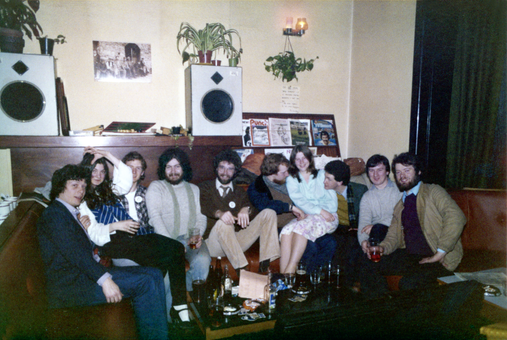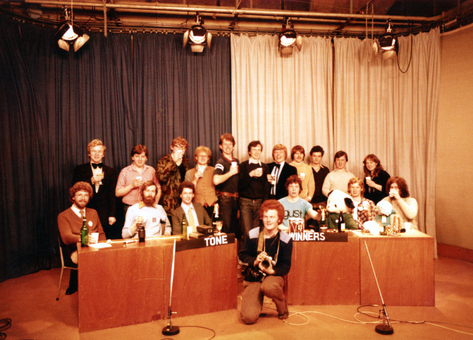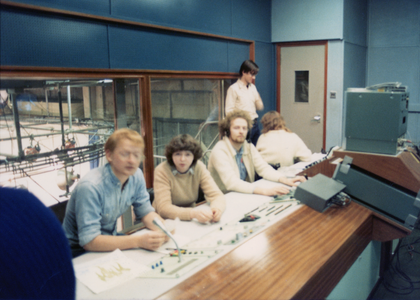From The Archive: GUST is 60
- domkullander
- Jun 18, 2024
- 10 min read

In student television, no station has been doing it longer that GUST. The grand auld institution from Glasgow has been in operation since 1964, making it the oldest student-run station in the world. STAN salutes 60 years of history from one of NaSTA's most recognisable affiliates.
In their 6 decades of broadcasting, GUST has furnished our alumni community with some stellar members – Steven Moffat (Doctor Who, Sherlock), John Hardie (ITN) and Andrew Neil (Daily Politics) to name just a few can all trace their early beginnings to GUST HQ in Glasgow.


For student television history buffs, the GUST archives represent a treasure trove. Fortunately, these tapes have been remarkably well-preserved by the university (and we're sure many alumni will affirm this is sadly not always the case). Whether it's an 80s detective drama starring the aforementioned Moffat, Monty Python-inspired sketch comedy from the 70s, or a 90s student takeover of BBC2, the GUST library does anything but disappoint.
The importance of student television in Glasgow's cultural history is clear to see when combing through the archives. Local icon Billy Connolly makes an appearance, along with a live performance from Belle & Sebastian, and the first music video from alumna Emile Sandé. If it comes from Glasgow, it usually makes it on to GUST.

Back in 2014, GUST 50 – Unpacking The Archives was launched, to celebrate the station's half century. It would be the most extensive student television archival project ever seen.
The undertaking proved hugely popular with alumni, who enthusiastically submitted old videos and photos to help with the project. One of the team's favourite clips led to some detective work, and unearthed Academy Award winner and GUSTie Alex Graham (Man On Wire). These interactions remind us of the importance of our alumni community, and the irreplaceable role student television plays within the industry.
The GUST 50 project inspired the future career of then-GUST Controller Sarah Battensby. She now works as an Archive Assistant Producer, where her typical day involves spooling through archive material, finding hidden gems, and organising it all for documentary makers. STAN are delighted to be hosting an evening with Sarah on Wednesday October 9th at 19:30, where she will delve more into the magical GUST tape archives, discuss the GUST digital archive project, and offer practical advice for stations looking to pull together their own history. It will be an event not to be missed for alumni and current students alike, and you can find that event here.
But first, stick the kettle on, pull up an armchair, and read the tales of GUST's past, as told by those who unpacked the archives....

Sarah Battensby
Then: GUST 50 Deputy Project Director & Station Controller 2014-16
Now: Archive Assistant Producer
Approaching the GUST 50 Project
Luckily, some thoughtful GUSTies from the past had donated boxes of tapes to the university archives – they must have had posterity in mind! The tapes dated back as far as the 1970s, and the archives allowed the team access to the material so they could view and digitise anything interesting.

The archive material was on various tape formats including; U-matic (hi-band and lo-band), Betacam, VHS and DVCPro. The tapes were held in various boxes but they were not always well described. Some material had titles, descriptions and dates noted on the labels, but many others were mysteries! In 2014, GUST was very much in the digital age, so tape formats weren't something the team were used to working with. Thankfully, the GUST office still housed a lot of old equipment, including tape players, which the technical team were able to fix-up so that the tapes could be played and watched via a monitor, and later digitised. There were tens of tapes of varying lengths, so it was impossible to go through them all with such a small team working on one piece of equipment. Viewing the tapes and digitisation was also done in real time, so it was a time consuming process.
Anything that was particularly funny or interesting was prioritised for digitisation. There were a lot of tapes, and hours of footage to go through so the team did as best they could in the time that was available to them. The digitised clips were then edited and uploaded to GUST's website and social media channels in the lead up to the GUST50 event.
Hidden Gems
I always remember the 'Beer Bar Song' from 1977. It's a short, silly performance of three men in the GUST studio singing a 'drunken' tune about the iconic Glasgow University Union Beer Bar. It's only from the 70s but it has that traditional Scottish Music Hall vibe which screams nostalgia. After it had been unearthed from the archives, I remember quoting it with GUST friends all the time! It's such a fun video and it's heart-warming to see that students in GUST have clearly always had fun; and that's the primary purpose of GUST really – to bring people together and have fun while making programmes.
I didn't appreciate quite how historic and important GUST was until engaging with the archive material. It made me really proud to be part of something; a community and a history, which was so much bigger than I realised. It was also so encouraging to learn that some of the students we saw in the archive material had used the skills they first learnt in GUST to go on and make a successful career in the media. If you stick with student TV, the skills you learn are so valuable and genuinely transferable to the real world, and the friends and memories you make can last a lifetime.
Tips for Archivists
Digital files are particularly vulnerable to corruption especially if not properly backed-up, and many tape formats are at real risk of physical degradation and obsolescence; meaning the tapes may not be able to play because of ageing and/or the equipment necessary to play them may no longer be readily available. The longer you wait, the higher the risk of data loss. Start backing up your digital files as soon as possible, and organisation such as cataloguing can come later if absolutely necessary. If your university has an archive, it could also be helpful to contact them to see how they might be able to support you in your project. Archivists are preservation professionals and can help with physical and digital projects. They may already hold material which has been donated in the past which you can access, or they may be willing to take donations which they can preserve for the future going forward.

Arielle Vishny
Then: GUST 50 Lead Archivist
Now: Writer
Curating Material
We knew we were coming up on the 50th anniversary, and as a station with so much history, we wanted to be able to showcase some of that for the anniversary celebration that was planned. Knowing that we were going to put something together for the GUST 50 celebration, we were especially on the hunt for content that might feature or have been created by prominent alumni, or things that had received award recognition.
Tricky Tech
The biggest technical difficulty was finding a way to digitize all the different tape formats in a singular work station that could fit in the GUST offices. 50 years of content meant 50 years of recording technology, and we were just a group of students, not a professional film archive. Working as a team, we eventually assembled, over the course of a few late nights in the office, what we called "The Hydra" because of the many, many cords involved, to the point that it resembled that mythical serpent.

A lot of time was spent shifting through boxes, putting tapes in the Hydra, and hoping that the system wouldn't crash or overheat. Some tapes were labelled better than others, so sometimes you had a clue at what you were about to get, but honestly you couldn't really know until you played the tape.
The thing I remember most fondly is the long hours spent in the GUST offices assembling the Hydra and getting the thing to work. I had an interest in the station's history and archive projects, but I wasn't the station's tech whiz. I learned so much by working with my fellow GUSTies, it was a reminder of how much of the work of student TV isn't about what makes it on the screen. The different tapes, formats, and the time involved with making sense of it all was a massive undertaking. But what made it fun was the team. My fellow GUSTies were easily some of the hardest working students I knew and also incredibly welcoming. This would never have come together if it wasn't so much fun to spend time together.
Advice for Archivists
Because you're hoping the archive will outlive you and your time at Uni, make sure you are a good mentor. Share info and train the people around you and get them excited about this work, so that it continues well after you've graduated.

Anna Brock
Then: GUST 50 Archive Technical Lead
Now: Production Coordinator, Writer & Editor
A Station Through Time
The archive project ended up being one of my favourite things that I did in GUST. I enjoyed learning about old formats and the quirks of mechanical tape decks. It was also a great way to connect with the history of student television. There were some massive changes over the years – earlier content had a lot of skits and almost nothing was filmed outside. As more portable cameras became available, there was more flexibility. The content was no longer tied to the studio. There also seemed to be more variation in the formats we saw as a result, although it is possible this is in part just down to what material survived and what we had access to. And some things never changed – for example, there was more than one Blue Peter parody. One big difference that stood out, particularly after speaking with GUST alums, was how much the barrier of entry had dropped over the years. I felt very lucky to work on this project, and to really feel a part of (at the time) 50 years of student television.
Learning New (Old) Things
The sheer volume of footage was something we sort of knew was insurmountable from the start. We only had a few months, there were only a few of us archiving. We just weren’t going to have the time to digitize everything. There were boxes of tapes in storage. The labels were minimal; there was nothing that gave any real insight on what we were going to find. But we were lucky to find some compilations made by previous GUSTies. This gave us something to jump off from. Other than that, we just tried to get through as much as possible. It was always exciting to see what was on the next tape
I ended up joining the project because it was having issues. Our tech coordinator, Arif, said that he had bad news about the archive project: the tape decks all had various problems – tapes were jamming, a colour tape was playing in black and white. They sounded liked solvable problems, and since my father worked on U-matic and Beta in the 80s, I offered to call him and ask for advice. We ended up having a functioning archive station by the end of the day. The black-and-white issue turned out to be simple and just due to not having familiarity with the equipment – we were playing a hi-band U-matic tape on a lo-band player. So we had to dig out another machine. Nothing was wrong, we just had to learn new (old) things.
Don't Panic
The state of the equipment and material was variable. We had to be careful with the equipment, learn a little about basic maintenance, and had some guidelines that mostly focused on concerns that might not come to mind for people used to working with digital formats. For example, we would leave the computers on, but had the emphasize the importance of remembering to turn off the tape machines. Especially since we didn’t have a rack – equipment was just stacked on top of each other – we were concerned about heat and didn’t want things on longer than they needed to be to digitize material. Working with the analogue/mechanical equipment was also just something of a different mindset. Some of the skills we needed, though, were the same as always – like not panicking when things go wrong. Whether something was wrong with Premiere or the U-matic player suddenly wasn’t ejecting tapes, you still needed to respond calmly, troubleshoot, maybe do a bit of research. It was a great experience.

Martin Heron
Then: GUST 50 Publicity Coordinator
Now: Producer, Director & Editor
Favourite Finds
There was one programme from the early 1980s that was styled as a shady detective mystery around campus, and we eventually realised that one of the two hosts was a young Steven Moffat, the future producer and writer of Doctor Who, Sherlock and much more! Steven was one of our guests of honour at the GUST50 event so it was really fun to find some great footage of him we could use in promotional material. It was only at the GUST50 event that our other GUSTie of Honour John Hardie (at the time Chief Executive at ITN) told us that he was the other host in the same video! To be fair, he was disguised with a hat, glasses and moustache though, so a little bit less discernible.
Changing Styles
It was a lot of fun seeing bygone eras, that in one sense felt very old in hindsight but also that GUST was very much always experimenting and chasing the new styles of the time. The 70s programmes had a real formal, well-structured basis, but within that they were clearly having fun with VTs and music and politics. In contrast, the early 2000s content was very Channel 4, gonzo film-making, playing around with animation and VFX and the much more portable cameras that were available. They seem a world apart on paper but GUST was always providing a platform for people to gain skills for the modern industry at that time.
Finding Alumni
We filmed a lot of interviews with alumni and some current GUSTies, and we knew some beforehand but a few were definitely nice surprises! There was a lot of enthusiasm from the older crowd and some of them provided great photos and old videos. The biggest surprise was one member from the 1970s who’d been prominently featured in one of our favourite clips, and we contacted him for an interview on that basis. It was Alex Graham, who we then discovered went on to be a very successful producer in the industry, including winning an Academy Award! The first thing you see when you enter his house is a photo of him with the Oscar for the documentary 'Man On Wire'. All I knew when I contacted him was that he was the hairy bloke from the Bear Bar song in the 1970s. So it accidentally was a very fruitful connection to have made.

Kristian Hentschel
Then: GUST 50Team Member
Now: BBC Research and Development Engineer
Advice for Archivists
Other than recovering and cataloguing past material, also think about how your current output is being logged and stored, and how the outcomes of your archiving efforts will be preserved. The institutional memory of student TV stations can be quite short as people tend to finish their degrees after three or four years! Student union websites are rebuilt every few years, servers get decommissioned and replaced, even platforms like YouTube are not guaranteed to stick around forever or can be hit by copyright strikes at any point. We worked with the university's archive services in the hope that at least the original tapes would be cared for-certainly better than being exposed to the summer heat on a shelf in our top floor office. However, I still regret not taking a personal database backup of the archive website with me when I graduated as it's no longer online!
Imgaes courtesy of Richard Dikstra


























Comments